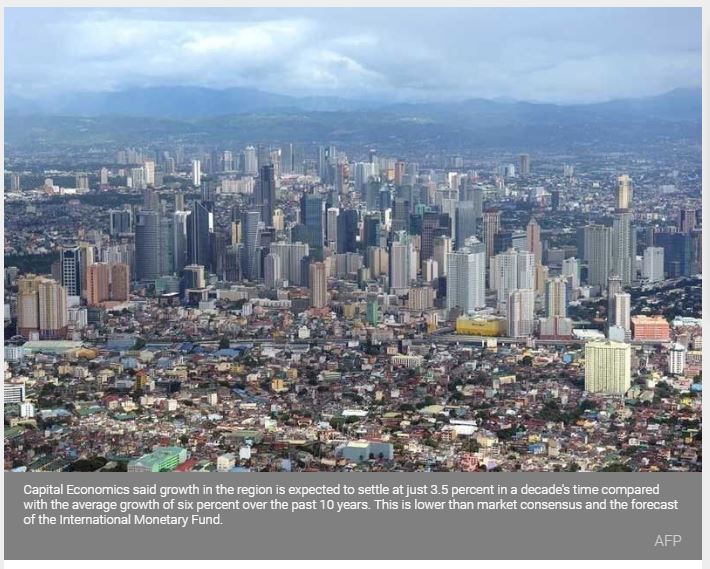Emerging Asia seen to weaken
Political instability threatens Phl economy — think tank
MANILA, Philippines — Growth in emerging Asia – especially in developed countries which are major export markets of the Philippines – is expected to remain weak over a 10-year period because of slowing productivity and shrinking working age population, said London-based Capital Economics.
In a research brief, the think tank said growth in the Philippines is particularly threatened by poor policymaking and political instability.
Capital Economics said growth in the region is expected to settle at just 3.5 percent in a decade’s time compared with the average growth of six percent over the past 10 years. This is lower than market consensus and the forecast of the International Monetary Fund.
The firm said that cyclical factors do account for some of the present weakness in the region.
“Weak global demand and a shift in the electronics inventory cycle has led to a slump in demand for exports. The impact of last year’s aggressive interest rate hikes is also weighing heavily on domestic demand in a number of countries,” Capital Economics said.
The escalation of the trade war between US and China will also continue to impact China’s export performance as well as those looped in its commodity value chain.
Looking beyond the current cyclical downturn, the region is burdened by structural problems that hamper productivity.
Working age population, for instance, has slowed sharply across the region. To address this, policymakers have taken measures to boost fertility and encourage more women into the labor force.
“So far, these steps are proving ineffective, and international experience suggests it will be difficult to engineer a big turnaround,” Capital Economics said.
Lower productivity growth is also seen especially in the original tiger economies in the region such as Hong Kong, Taiwan, Korea and Singapore primarily because of demographic downturn. These countries are among the major trading partners of the Philippines.
Policymaking is also seen as a factor in productivity slowdown in several countries. In China, policy has been focused on tightening support for state-owned firms rather than liberalizing the economy.
In parts of South East and South Asia – Philippines, Thailand and Pakistan – political instability has also played a role.
“While the fundamentals are in place for strong growth in the Philippines, the country’s unstable politics means the downside risks there are mounting,” Capital Economics said.
In an earlier brief, the firm said President Duterte’s “increasingly autocratic tendencies, including his willingness to undermine political institutions and attack his opponents, have cause foreign investors to take fright.”
“Putting all this together, we think that the structural slowdown across much of emerging Asia will continue, with slower growth in the working age population (or in the case of some countries falling working age populations) and lower productivity growth likely to continue to drag on prospects over the next decade,” Capital Economics said.
It noted, however, that a growth rate of 3.5 percent would still make emerging Asia one of the fastest growing regions in the world.
Source: https://www.philstar.com/business/2019/06/14/1926175/emerging-asia-seen-weaken#RB2L4g3WxM4MIt0h.99


 English
English




